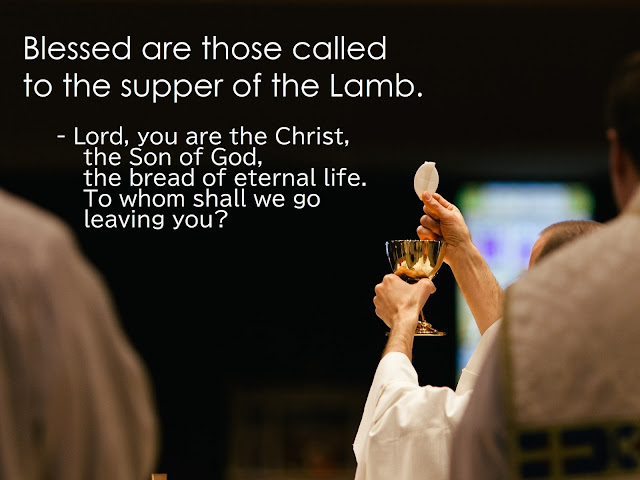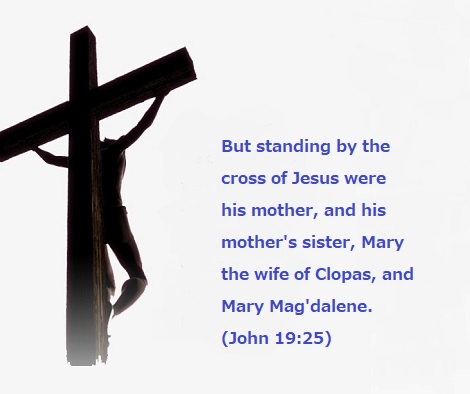The Estuary of Theology 27
Blessed are Those Called to the Supper of the Lamb
In the Catholic Church in Japan, people recite the Confession of Faith immediately before the communion*1 that is taken from the confession of Peter the Apostle. On the other hand, the words of the Confession of Faith in the typical edition of the Roman Missal are taken from the words of confession of the centurion,*2 and I heard that people in most countries outside Japan recite them. In this situation, some have suggested that the words of the Confession of Faith as used in Japan should be adapted to the typical edition of the Roman Missal. I heard that in Japan, after the Second Vatican Council, when the liturgical texts were translated into Japanese, some consideration was needed on this point. It seemed that the authorities worried that if after the priest said, “Blessed are those called to the supper of the Lamb,” the congregation were required to respond with the centurion's confession of faith, the Japanese faithful would shy away and leave without receiving the Eucharist.
*1 “Lord, you are the Christ, the Son of God, the bread of eternal life. To whom shall we go leaving you?”
*2 “Lord, I am not worthy to have you come under my roof; but only say the word, and my servant will be healed” (Matthew 8:8)
Japanese are known to use “Honne” (one’s true intention) and “Tatemae” (one’s official stand) separately. I think, however, the cultural fastidiousness of the Japanese towards a certain contradiction is at the root of this fact. Considering this, many Japanese may find it contradictory to go to receive the Eucharist, contrary to the words of the proclamation before the communion like the centurion: “Lord, I am not worthy that you should enter under my roof, but only say the word and my soul shall be healed.” Authorities may have feared that the Japanese would be uncomfortable with the requirement to be inconsistent in word and deed in the official scene. So, I think they hoped to change it to something that the Japanese would say with conviction. And I strongly hope that, at least in Japan, the current wording of the Confession of Faith in the liturgy of the Mass will be maintained. This is not only because of the cultural background and the missionary situation of the time but also because, as I will discuss below, it is theologically appropriate to answer with the words of the confession of Peter the Apostle, guided by the words of the priest: “Blessed are those called to the supper of the Lamb.”
The words “Blessed are those called to the supper of the Lamb” are taken from the verse of the Book of Revelation, “And the angel said to me, ‘Write this: Blessed are those who are invited to the marriage supper of the Lamb.’ And he said to me, ‘These are true words of God.’” (Revelation 19:9). The “marriage supper of the Lamb” is the heavenly feast, to which the heavenly Father invites us. On the other hand, it is Jesus himself who invites us to the “supper of the Lamb” in the liturgy of the Mass on earth. The words of Jesus, “[A]nd I, when I am lifted up from the earth, will draw all men to myself” (John 12:32), fulfilled on the cross, has made the words “No one can come to me unless the Father who sent me draws him; and I will raise him up at the last day” (John 6:44) universal. In the same way, the blessedness of those who are invited to the “supper of the Lamb” has made the blessedness of those who are invited to the “marriage supper of the Lamb” universal. For those who are nourished at the “supper of the Lamb” will soon move to the “marriage supper of the Lamb” in heaven. Therefore, by the descending Holy Spirit, the earthly supper is continuous with the heavenly marriage supper. So, those who say the words of the Profession of Faith before communion are at the “supper of the Lamb,” and at the same time, they see the “marriage supper of the Lamb.”
We will look at the words of Peter’s confession in each of the four Gospels in turn. In examining them, I used as a key phrase the following words from the above verse of the Book of Revelation: “These are true words of God.” The words “Write this: Blessed are those who are invited to the marriage supper of the Lamb” are said to be the “true words of God” here. Therefore, the words of the priest’s call in the earthly supper that is continuous with the heavenly marriage supper, “Blessed are those called to the supper of the Lamb,” are also the “true words of God,” and the Confession of Faith that is fitting as the response to this call must also be the “true words of God.” So, we will examine Peter’s confession with the key phrase, “the true words of God.”
In the Gospel of Matthew, when Jesus asked his disciples, “But who do you say that I am?” Peter replied, “You are the Christ, the Son of the living God” (Matthew 16:16). Jesus said of these words, “Blessed are you, Simon Bar-Jona! For flesh and blood has not revealed this to you, but my Father who is in heaven” (Matthew 16:17). From these words of Jesus, we can say that the words of Peter’s confession were the “true word of God” that directly conveyed the will of the heavenly Father.
Next, we will examine the Gospels of Mark and Luke. Both Gospels contain Peter’s confession on the same scene as Matthew’s Gospel, but in both Gospels, Peter answers only that Jesus is the Messiah. When Jesus hears his answer, he ends by charging his disciples and commanding them not to speak of this to anyone (cf. Mark 8:27-30; Luke 9:18-21). In response to the words of Peter’s confession in these Gospels, Jesus does not say anything that indicates Peter’s confession is the “true words of God,” as in the Gospel of Matthew. This may be because the words “the Son of the living God” were not in the confession.
Finally, we will examine the words of Peter’s confession in the Gospel of John. In John’s Gospel, the scene leading up to Peter’s confession begins with Jesus’ answer to the words of the crowds who had come looking for him after the sign of the multiplication of the loaves (cf. John 6:26). The dialogue with them soon developed into an exchange with the Jews who murmured when they heard Jesus’ words, “I am the bread which came down from heaven” (John 6:41), and when Jesus revealed that he was the true food and the true drink, many of the disciples who were listening to this exchange with the Jews took offence at this and complained. So, when Jesus said, “This is why I told you that no one can come to me unless it is granted him by the Father” (John 6:65), they went away, turning their backs on him, and no longer went about with Him.
Jesus asked the twelve disciples who remained, “Do you also wish to go away?” (John 6:67). To this question, Peter replied: “Lord, to whom shall we go? You have the words of eternal life; and we have believed, and have come to know, that you are the Holy One of God” (John 6:68-69). The twelve disciples who remained with Jesus shared the words of Peter’s confession, and they were indeed the ones who had “come to Jesus,” as Jesus had said. Therefore, the words of Peter’s confession are the words of “the one whom the Father has granted.” So, these words are “the true word of God.” The words of Jesus, “[N]o one can come to me unless it is granted him by the Father,” indicated that Peter’s confession in John’s Gospel was “the true word of God.”
After this confession of Peter, John the Evangelist wrote, “Jesus answered them,‘Did I not choose you, the twelve, and one of you is a devil?’ He spoke of Judas the son of Simon Iscariot, for he, one of the twelve, was to betray him” (John 6:70-71). This phrase, which foretells the betrayal of Judas, corresponds to the scene in the three Synoptic Gospels where Jesus institutes the Eucharist at the last supper. By adding this phrase, John the Evangelist, who did not write the scene of the institution of the Eucharist, connects this scene with the scene of the institution of the Eucharist in the Synoptic Gospels. In this way, John clearly conveyed, by the words of Jesus in this scene (cf. John 6:26-40, 44-58), that the institution of the Eucharist was that the Father willed and the earnest wish of Jesus who bore the will of the Father. The words of Peter’s confession in John’s Gospel, therefore, aimed for the scene of the institution of the Eucharist, the “supper of the Lamb.”
Peter’s confession in the Gospel of John: “Lord, to whom shall we go? You have the words of eternal life; and we have believed, and have come to know, that you are the Holy One of God” (John 6:68-69) is characterized by the fact that, as he says “we,” the confession is not only of the disciples who remained with Jesus, but also of all the Christians who followed them, and that, as expressed by the words “we have believed, and have come to know,” it is proclaimed with the recognition of true faith in which believing and knowing are united. As Jesus said, “When the Spirit of truth comes, he will guide you into all the truth” (John 16:13), so this confession is appropriate to be said by Christians who are guided by the Holy Spirit after his descent through the Passion, Death, Resurrection and Ascension of Jesus Christ.
The blessedness of “those called to the supper of the Lamb,” that is, of those who attend the Mass, is the blessedness of those who, in the presence of the Holy Eucharist, have the words to answer Jesus’ two questions: “But who do you say that I am?” (Matthew 16:15) and “Do you also wish to go away?” (John 6: 67). In addition, the words responding to the blessedness must be “the true words of God”, as Jesus’ words point out: “For flesh and blood has not revealed this to you, but my Father who is in heaven” (Matthew 16:17) and “[N]o one can come to me unless it is granted him by the Father” (John 6:65). I am convinced that the words of the Japanese version of the Confession of Faith fulfil this condition. Moreover, for the sake of us Christians, who are led by the Holy Spirit, I sincerely hope that the words that John the Evangelist wrote: “[W]e have believed, and have come to know,” will be added to the Japanese version of the Confession of Faith.
“Blessed are those called to the supper of the Lamb.”
“Lord, you are the Christ, the Son of God, the bread of eternal life. To whom shall we go leaving you?”
To be continued.
Jun. 2021 in Hiroshima
Maria K.


Comments
Post a Comment